143 Search Results for tabi
October 23, 2014
by Carole Zangari -
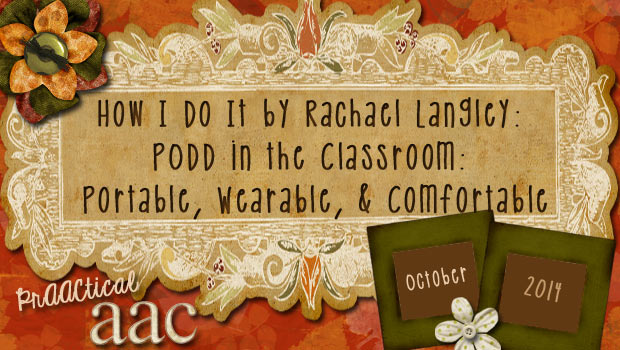
We return to Michigan today to hear more from school-based SLP, Rachael Langley. In this post, Rachael shares some prAACtical thoughts on making PODD books always available for communication. ::::::::::::::::::::::::::::::::::::::::::::::::::::::::::::::::::::::::: The PODD system offers a complete language approach through carefully organized symbol sets. Because the PODD system promotes a language immersion model, there is no pressure on our language-learners reproducing specific words or patterns at a specific rate. The primary requirement is that adults are modeling PODD for our language-learners. In order to be sure that the PODD books were being used throughout the day, the books had to be PORTABLE, WEARABLE, and COMFORTABLE. Forget any of these three features and PODD books are at a high risk of being stuck on a shelf. My new hobby has become collecting other people’s ideas for how to make PODD books comfortable to carry around. I’ll spare you the pictures of my... [Read More...]
May 26, 2014
by Robin Parker -
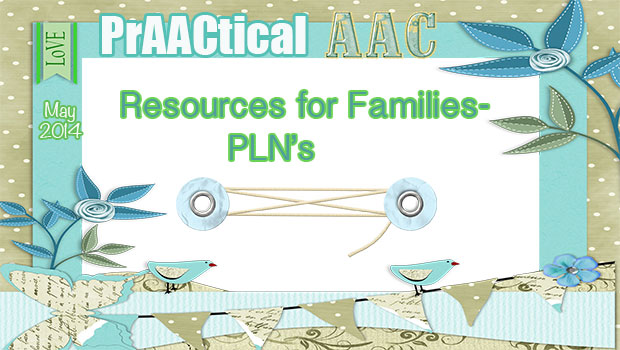
This month’s ‘Strategy of the Month’ has been focused on supporting families. To fully support families, it is essential to provide family friendly resources that can aid in creating Personal Learning Networks (PLN’s). The more families know and learn, the more likely the AAC learner will progress in their communication skills. Also, the more information families have, the better advocates they will become. And since families are one of the only constants in an AAC learner’s educational and life journey, the family is really the most important part the communication team. About AAC About AAC- ASHA AAC Institute- Parent’s Corner Center for AAC & Autism AAC -Family Resources Assistive Technology Resources- Autism Speaks Communication Matters Communication Books & Boards ConnectAbility http://www.setbc.org/pictureset/ Pre-made Communication Boards Help Designing Communication Books Free & Discounted AAC Apps Appy Malls Smart Apps for Kids Moms with Apps The iMums Apps Wheel *(categorized wheel of apps to... [Read More...]
April 1, 2014
by Robin Parker -
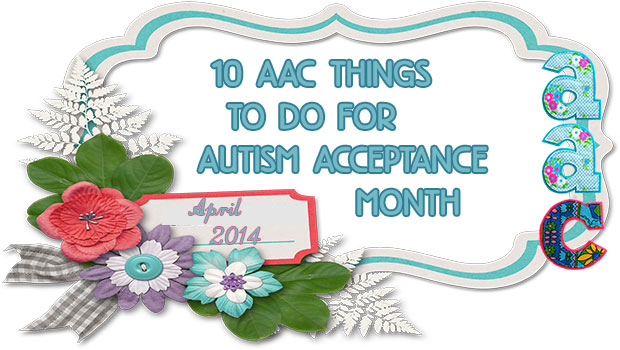
We love Autism Awareness and Acceptance Month. There is so much excitement and great community activities. The month becomes very busy so we love choosing events and projects that facilitate autism acceptance and AAC learning. We pass out materials, have contests, do extra trainings and have many public awareness events. We make sure to support our events and activities with AAC materials. Here are some of the things we do and recommend to support AAC and Autism learning. Please share any activities or projects that you know about. Bake, share, & eat some desserts. Use and include visual recipes when cooking. Need inspiration?.. Go to Your Special Chef for shopping lists and recipes. Educate peers visually by using the Autism Acceptance Book: Being a Friend to Someone with Autism by Ellen Sabin Develop & Use a personal participation story (modified social story) to let alert someone that this will... [Read More...]
March 21, 2014
by Carole Zangari -
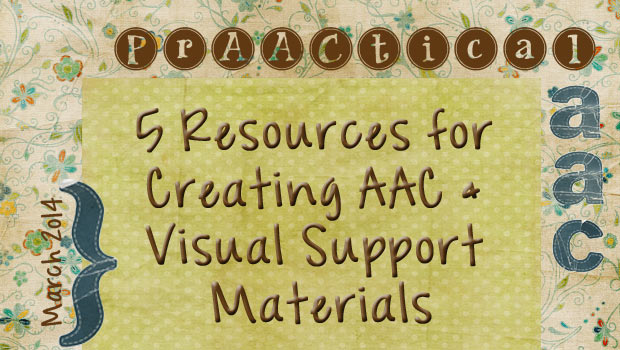
We are fortunate to be prAACticing at a time when there are so many options for creating visual supports and AAC materials. From sophisticated to simple From costly to free From PCS to SmartySymbols and more From one-time purchase to ongoing subscription From computer to mobile device There is a way for prAACtically anyone to make AAC materials, picture schedules, and other visual supports. Here are some of the products we use. Boardmaker Custom Boards SymPrint LessonPix ConnectAbility Visuals Engine
February 28, 2014
by Carole Zangari -
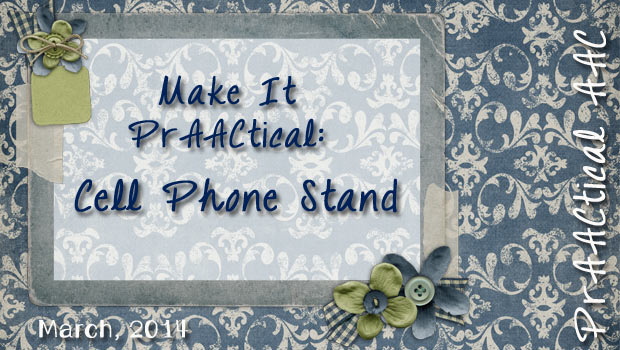
AAC professionals are generally big proponents of multimodal communication. These days, it seems like almost everyone has a cell phone and many of the AAC learners with whom we work use them for texting. If you need a low-cost stand for a cell phone, take a look at this video from the New Hampshire AT Project. With a little stabilization, this might be just the ticket for some of our prAACtical friends. Direct Link to Video: http://www.youtube.com/watch?v=oQhRhKFWklo&feature=share&list=UUOhlN8JnAwdYrhWEdWpmE3g&index=3
October 8, 2013
by Carole Zangari -
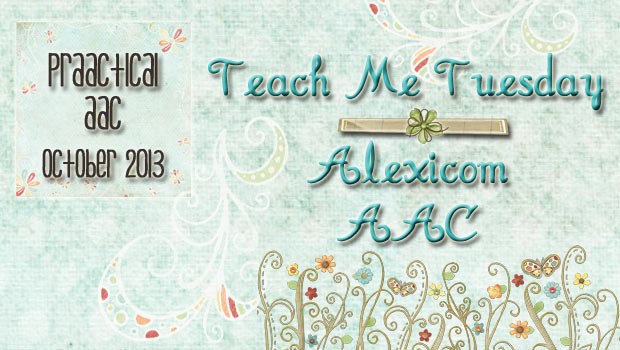
Teach Me Tuesday is a new feature that offers prAACtical resources for our colleagues who are looking to learn more about SGDs and AAC apps. Each week, we’ll share training resources that we’ve found to be helpful for those of us teaching ourselves how to use these things. There is no rhyme or reason to which ones we share each week, and endorsement should not be implied. As always, it’s up to each SLP and team to make recommendations based on their assessment data and other relevant factors. If you have devices or apps that you need to know more about, feel free to contact us and we will put that on our list. If you are an author, vendor, or developer who wants to share materials with us, we certainly welcome and appreciate that, but they must come with no strings attached. The product may or may not get... [Read More...]
September 21, 2013
by Carole Zangari -
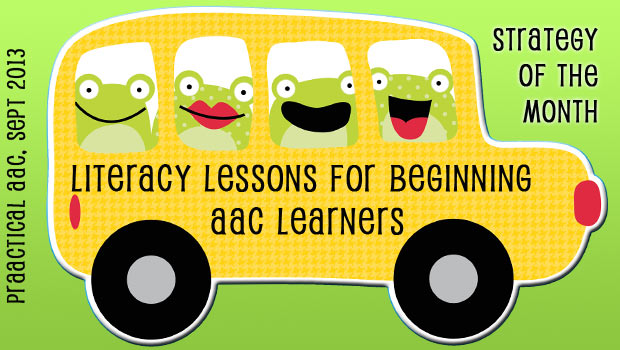
Like some of you, we are often met with skepticism when we encourage teams to work on literacy skills with individuals who are still learning the very basics of communication. Recently, we had the opportunity to begin this journey anew, and model a literacy lesson for kindergartners who have no formal communication system, are not answering yes/no questions, and do not consistently select preferred items when offered choices. Why work on literacy with students who are not routinely expressing their basic preferences? Because the longer we wait, the longer it will take to get there. Because it offers wonderful opportunities to build communication, too. Because when other people see us teaching reading and writing, it changes their perception of the student in a positive way. Because they will enjoy it. Because there are mandates for us to address the general education curriculum. Because if we set the bar high and... [Read More...]
August 30, 2013
by Robin Parker -
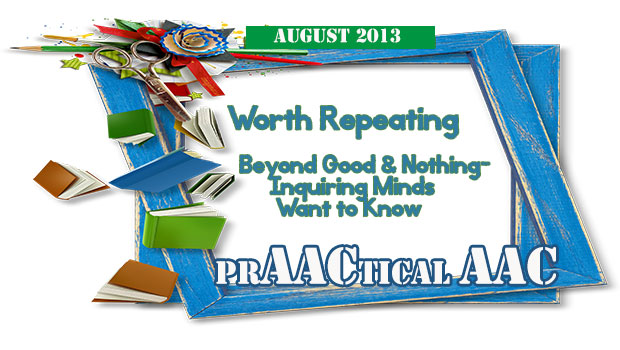
by Carole Zangari, originally published on August 27, 2012 “How was school?” (Good) “What did you do?” (Nothing) This scenario plays out in many cars and kitchens in the after school hours and it can be hard to know who is more frustrated: the kids for being asked or the parents for not getting satisfactory answers. And still, we repeat the process day after day. Of course, we want to know the fine details of what happened and how our children felt, but in some cases, we’d settle for ANY school-related conversation at all. I’ll be the first to admit that it took me way too long to get the hang of how to get information about my children’s school days, and it seemed like just when I did, pow! They were pre-teens and then teenagers. New rule book. Here are some ‘lessons learned’ along the way about those afterschool conversations and... [Read More...]
August 10, 2013
by Robin Parker -
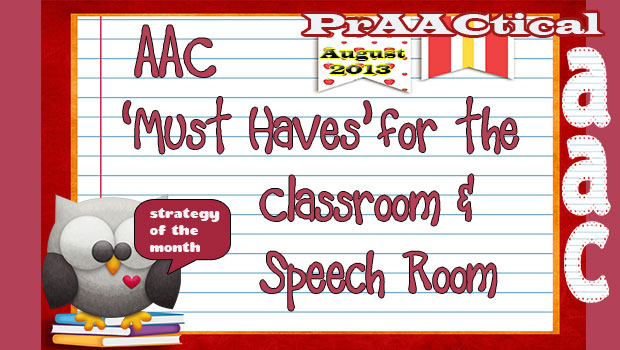
As we were getting ready for back to school and thinking about ‘must haves’, it quickly became apparent that it is not so easy to narrow it down. And the ‘must haves’ would definitely vary depending upon type of class, students, and even school. Based on a wide variety of differences, we organized a wide variety of choices to explore (we apologize in advance if we got carried away but…). Choose what you need, bookmark what you may need later and let us know your ‘must haves’ for a classroom and speech room AAC collaborative approach. We will create an ongoing list. Get Started Before School Starts Do these 10 Things to Get Started with AAC if you are new to an AAC student or classroom Provide AAC Support in the Classroom. Support teachers and educators with tips from Jane Farrall, & learn about AAC in the Classroom by Joan... [Read More...]
August 8, 2013
by Carole Zangari -
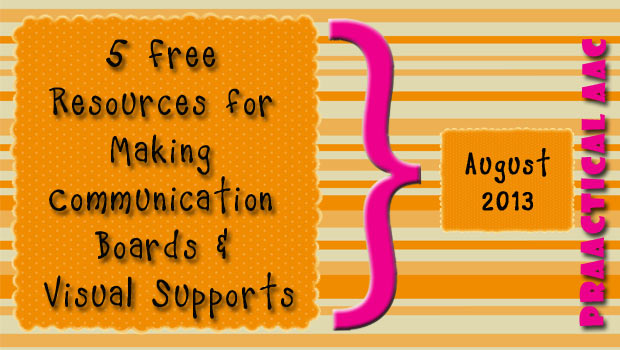
Because sometimes you need something quick, simple, and free. 1. Quick Pics from the Patrick Ecker AAC site 2. ConnectAbility’s Visual Engine 3. Picto4Me: An app for your computer that you can install to Chrome 4. PhotoSYMS program 5. Aragonese Portal of AAC: Over 14,500 symbols that you can download and use









